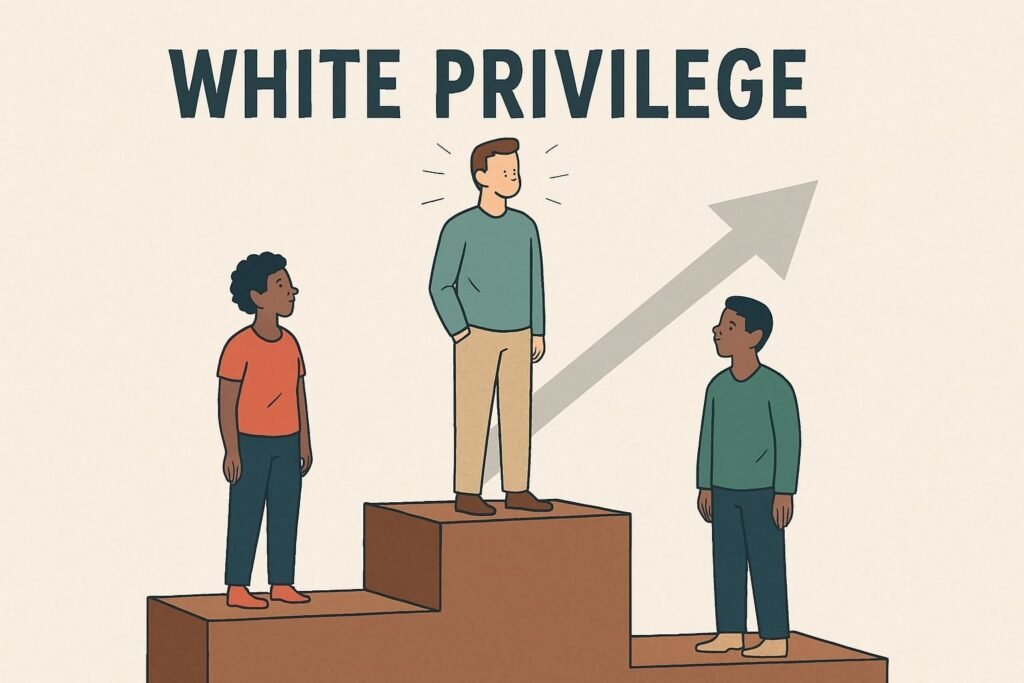Privilege Explained – From Theory to White Privilege
The Invisible Advantage
In activist language, privilege means unearned advantages you supposedly inherit from belonging to certain groups. It’s not about effort or achievement, but about the invisible benefits of identity — race, gender, sexuality, body type, or ability.
The idea started in universities as part of Critical Theory. Today, it’s mainstream: from HR training to media debates, “privilege” is the lens through which society is explained. And no concept has been pushed harder than White Privilege.
Table of contents
What Is Privilege?
In simple terms, privilege is defined as advantages people hold — often without realising it — because of their identity.
According to activist theory:
- A man has male privilege in a sexist society.
- A straight person has heterosexual privilege in a heteronormative society.
- An able-bodied person has ability privilege in a society built for them.
The theory claims that these privileges accumulate to create hidden systems of power, even if individuals never consciously exploit them.
Types of Privilege in Activist Thinking
The “privilege checklist” has grown over the years:
- Male Privilege: Men supposedly enjoy systemic benefits over women.
- Straight Privilege: Heterosexual people don’t face discrimination in relationships or marriage.
- Class Privilege: Those born into wealth have advantages over those born into poverty.
- Able-bodied Privilege: Society is said to centre the able-bodied while marginalising disabled people.
- Thin Privilege: Even body size is recast as an oppression narrative.
Each category creates its own activism, workshops, and campaigns — all built on the claim that invisible advantages explain inequality.
White Privilege – The Flagship Example
No version of privilege has shaped politics and culture more than White Privilege.
Core Premise
White people benefit from invisible advantages because of their race, regardless of wealth or effort.
Buzzwords
“Systemic racism,” “implicit bias,” “white fragility,” “check your privilege.”
Impact
- In Education: School lessons and university seminars on “whiteness.”
- In HR: Mandatory workshops where employees “acknowledge” privilege.
- In Media: Headlines framing almost every inequality as proof of White Privilege.
- In Politics: Used to justify race-based policies, quotas, or reparations.
Take
A concept designed to highlight bias has become a moral hierarchy, where entire groups are cast as guilty by default.
The Politics of Privilege
Privilege has jumped far beyond theory and into the mainstream:
- Academia: Universities teach privilege as fact, shaping the worldview of students.
- Activism: Campaigns use privilege language to frame every issue as oppression.
- Corporations: DEI training relies on privilege checklists to manage employees.
- Politics: Policies are justified not by universal rights, but by balancing privilege scales.
Privilege isn’t just an idea anymore — it’s a framework for rewriting society, with activists and consultants deciding who’s privileged, who’s oppressed, and who pays.
Why It Matters
The language of privilege shifts politics from universal principles to identity-based guilt narratives.
Instead of “equal rights for all,” the message becomes:
- Some groups are guilty, others are victims.
- Some voices must be amplified, others silenced.
- Some rights must be expanded, others restricted.
Privilege was meant to expose hidden bias. In practice, it fuels division, resentment, and endless bureaucracy — while leaving real economic inequality untouched.
From Theory to Dogma
Privilege began as an academic concept. Today, it’s a moral script used in classrooms, workplaces, and politics.
Its flagship idea, White Privilege, dominates debates — recasting complex issues as simple hierarchies of guilt and victimhood. The result isn’t more fairness, but more division.
Privilege no longer asks questions. It issues instructions: admit it, check it, and obey it.
See also: Privilege Accusations Explained – How to Push Back — a plain guide on how privilege is used as a trap, and 4 simple ways to respond.
FAQ: Privilege & White Privilege
What does privilege mean?
In activist theory, privilege means unearned advantages you hold because of identity markers like race, gender, or class.
What is White Privilege?
The idea that white people enjoy invisible advantages in society, regardless of wealth or effort.
Why is privilege controversial?
Because it reduces complex issues to identity categories, assigning guilt or victimhood to groups rather than individuals.
How is privilege taught in society?
Through universities, corporate DEI training, media campaigns, and policies framed around systemic advantage.
What’s the danger of privilege thinking?
It shifts focus from universal rights and class inequality to identity politics and guilt narratives.
How does privilege connect to equity and inclusion?
Privilege is the guilt lever used to justify equity policies and inclusion programs under DEI. Privilege sessions often go hand-in-hand with corporate DEI trainings.
See also: Equity Explained, Inclusion Explained.



